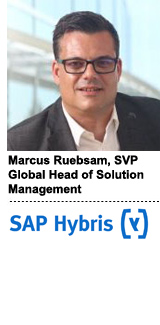
SAP acquired Gigya for $350 million in September for its consumer identity management solution.
The deal, which just closed, will help SAP extend its cross-platform identifier – the SAP Hybris Profile – to new channels like over-the-top TV and social.
It also gives SAP more clout to help companies manage their opt-ins amid looming privacy developments like the General Data Protection Regulation (GDPR).
Cross-platform identity management and attribution – via SAP’s acquisition of Abakus last December – are also selling points for the SAP Hybris Marketing Cloud.
AdExchanger spoke with Marcus Ruebsam, global head of product management, strategy and corporate development for SAP’s marketing and commerce business.
AdExchanger: There are a lot of marketing clouds out there. How does yours differentiate?
MARCUS RUEBSAM: Our marketing cloud products emphasize the data perspective. We never start with [the] campaign. Apart from unsiloing data, we’re looking at the whole behavioral aspect and how machine learning and artificial intelligence can help predict what the consumer wants and how we optimize their journey.
We focus on machine-learning innovation, whether it’s for facial recognition or attribution modeling or IoT-triggered campaigns. Another area where we will differentiate is around GDPR, which is not just a European problem. It is a US brand problem as well if you deal with European customers.
We already see GDPR [methodology] being applied in places like Australia and Southeast Asia, and believe it will shift the paradigm for consumer interactions. We believe that a consumer’s preferences will lead to a fundamental change in the way you can target a campaign.
Is SAP better equipped to manage these changes because of your European heritage?
As a German company, we’ve had to deal with this legislation for a number of years. This is an issue we’ve worked on for a couple of years now in the central European region. It’s not necessarily new, but GDPR is just the outcome of a long period of fundamental changes in the way marketers can use data in their campaigns.
How will GDPR most impact marketers?
The marketers, at least from a customer viewpoint, are the ones who face the biggest challenge in the enterprise. GDPR affects everything in a business, but marketers are the ones who need to understand who are their customers, are they the same across platforms and what [consent] have [they] provided?
We see lots of CMOs meeting with legal teams, particularly in consumer brand industries. I’ve seen very mature, major global brands where the CMO now asks the legal team [if they] can use certain technologies or what are the barriers legally. So it becomes the responsibility of the CMO to really own the customer and the relationship. But it’s also a strong opportunity for the CMO to move into a much stronger position within the company.
What about GDPR’s impact on vendors?
If you don’t have first-party data and you’re a brand, you are likely to risk your consistency and relevancy to the end consumer. First-party data has always been our key focus, [and has been a focus of our] M&A strategy.
A lot of third-party data vendors might not be relevant in the future anymore. Even if you have a cookie, you might need to get [additional] consent to retarget or [measure] through to a conversion. It just becomes a holistic challenge and I’m convinced we’re the only marketing cloud that’s that advanced to take this on.
How does SAP do identity management differently?
Our strength is in combining first-party data sources offline with the online. Thinking about digital, online and in-store … these journeys are still pretty disparate between the anonymous and the known.
That’s why we’re in the process of acquiring a strong leader [Gigya] in this market to even further strengthen our position here. The [SAP Hybris Profile] will be our solution to analyze behaviors, drive consistency, relevancy and contextualization. And the marketing cloud will be there to drive these journeys through to conversion and attribution.
What’s the future of ad tech and mar tech, according to SAP?
The rest of the market is still very focused on purely ad tech or mar tech data. And if these do not come together, brands won’t be able to drive holistic experiences. You asked earlier about Abakus. We bought them because attribution needed to be part of a marketing tech stack.
Traditionally, these attribution vendors were very focused on last-click and we already moved to multitouch attribution and want to move even further to customer-level attribution to really attribute dollars to a profile, a person or real outcomes.
Interview has been condensed.
Correction: SAP’s acquisition of Gigya closed on Wednesday, Nov. 1. An earlier version of the article noted the acquisition was still pending.
This post was syndicated from Ad Exchanger.

More Stories
Dismantling Google Will Not Fix the Adtech Ecosystem
Meta’s Threads Begins Global Ad Rollout Within Its Feed
Adtech Firm Criteo Is Pitching Hundreds of Retailers on a New Video Ad